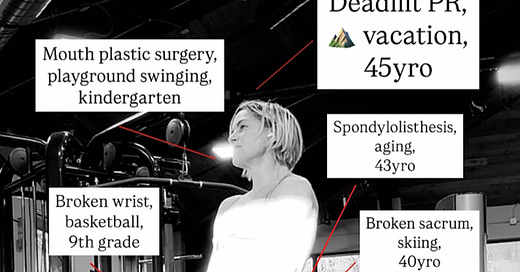I Forgot To Keep Saying Thank You When It Stopped Hurting
The comprehensive, science-backed guide to pain relief, plus my personal experiences with each modality.
The pain lives on the left side of my upper back, tucked between my shoulder blade and cervical spine. It’s mostly dull, occasionally sharp. Sometimes it radiates like electricity, showing up as pins and needles on top of my hand and in my palm. Out of nowhere, it morphs into a slow, steady pulse in my forearm.
It’s worst at night, especially when I’m trying to fall asleep, adjusting and readjusting to find a position that doesn’t make me scrunch my nose with a wince. And while mornings aren’t great, it’s the long travel days—planes, trains, car rides—that can make me tear up.
There are a few things that make it feel less aggravating: My morning “Tin Man” mobility circuit. Ice packs. Matt jamming his thumb into the oww zone until I stop saying (shouting) harder! My nightly rotation of herbal patches, heating pads, arnica, my Hypervolt gun (highest setting even though I know better), a heating pad. My toolkit is a mix of old-school remedies and high-tech gadgets, and while it sometimes feels like I’m a walking advertisement for the placebo effect, at least these modalities give me the illusion of agency.
If you happen to be dealing with a shoulder thing. Or a back thing, or a knee thing. Or just…a thing. (I see you out there: roughly 20% of adults worldwide live with some form of chronic pain, and it’s often driven by multiple factors at once, according to the International Association for the Study of Pain.) I hope this science-backed rundown of recovery modalities and OTC pain management tools that I’ve experimented with, plus what the research says about each one, helps you find some relief.
Keep reading with a 7-day free trial
Subscribe to Best Case Scenario to keep reading this post and get 7 days of free access to the full post archives.





